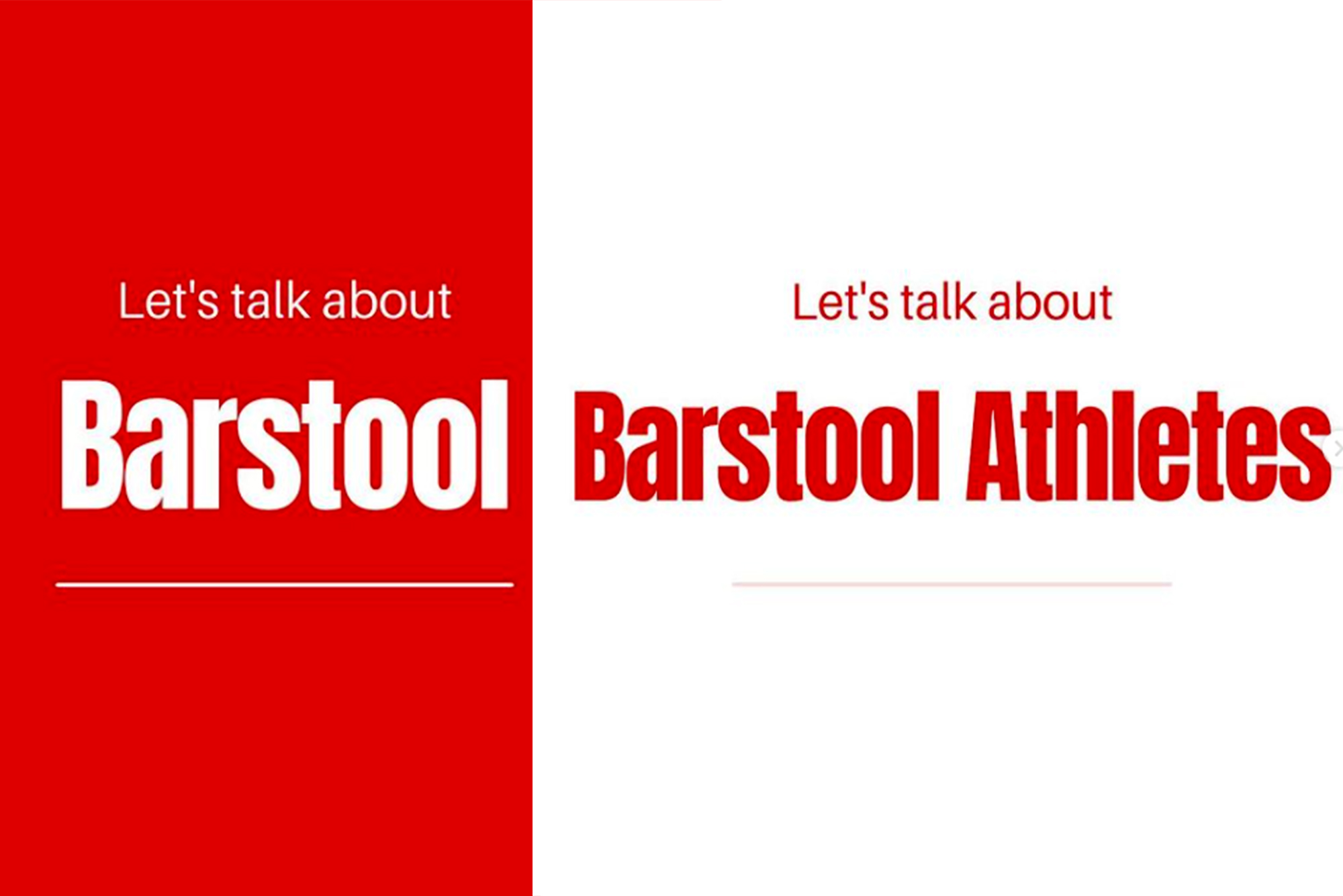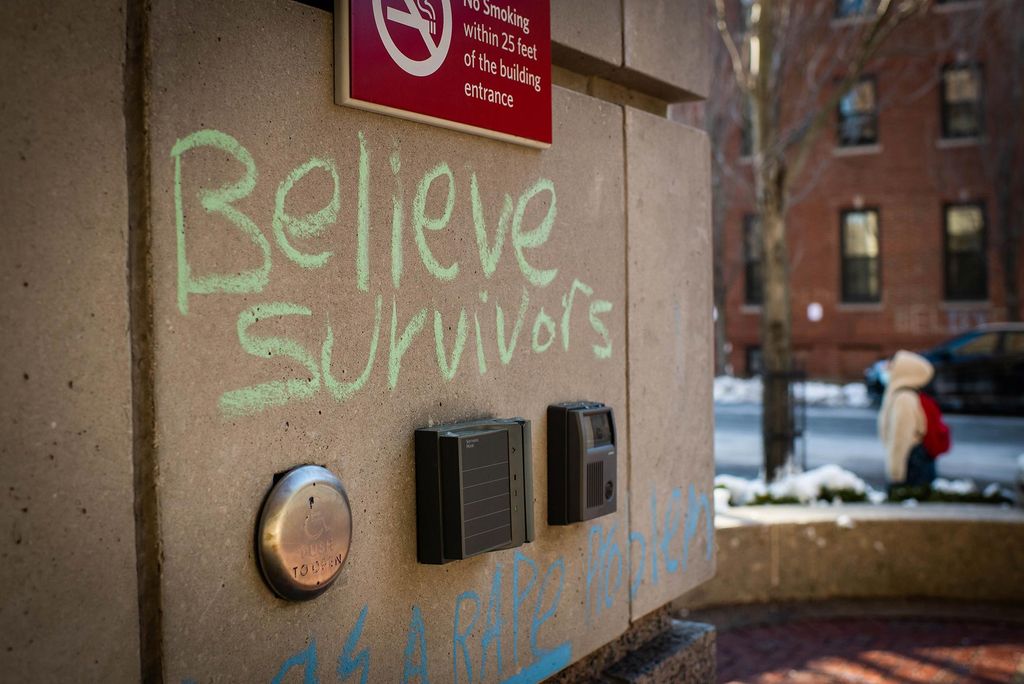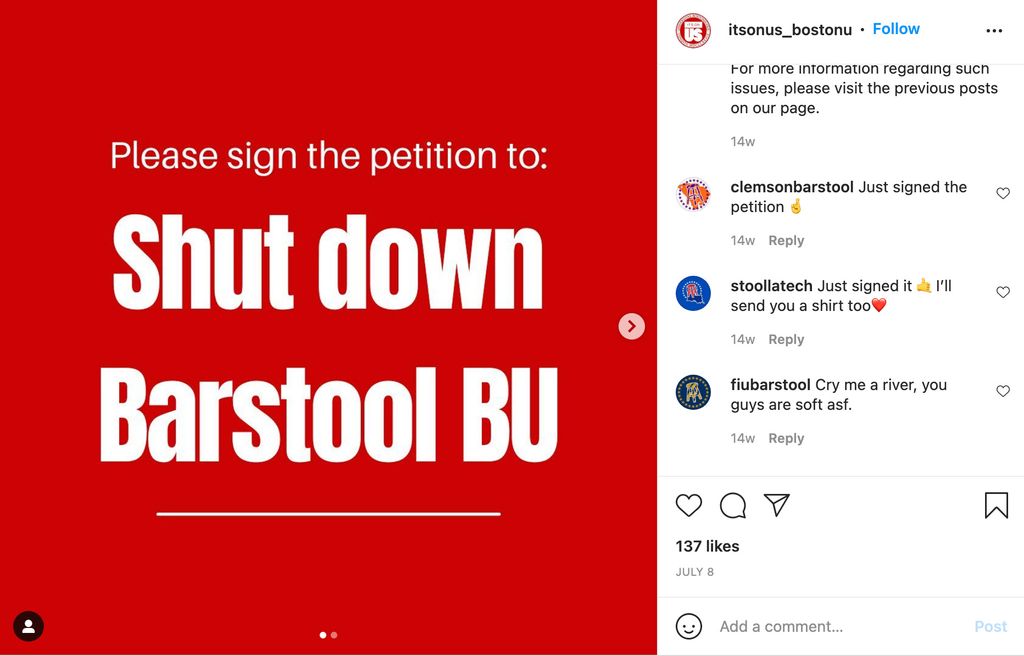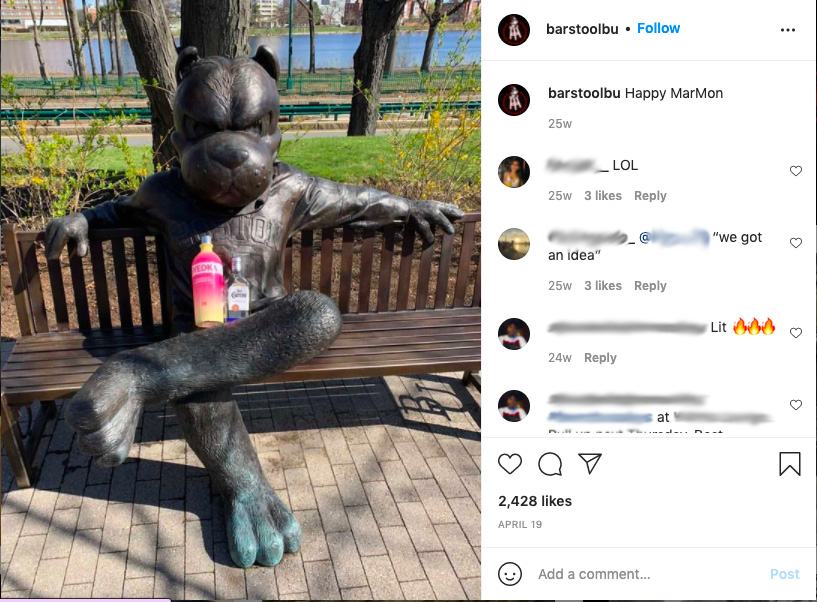Student Sexual Assault Survivors Group Campaigns to Shut Down Barstool BU
It’s On Us wants students to reevaluate their reasons for following the group

Screenshots from the sexual assault survivors group It’s On Us BU chapter Instagram page, when the organization announced its campaign to shut down Barstool BU.
Student Sexual Assault Survivors Group Campaigns to Shut Down Barstool BU
It’s On Us BU chapter wants students to reevaluate their reasons for following the group
Content warning: This story discusses sexual assault.
A video of a drunken brawl in Allston. A statue of Rhett with a bottle of strawberry lemonade Svedka in his lap. A T-shirt with a vulgar sexual rhyme. A send-off for a friend to “lose his virginity to a Tinder hookup.”
That’s just a small sampling of the content found on the Barstool BU Instagram page, a student-run account with more than 18,000 followers and a direct affiliate of sports and culture media organization Barstool Sports. (Barstool BU is not affiliated with Boston University.)
It’s also part of the reason the BU chapter of It’s On Us, a student sexual assault survivors group aimed at combating sexual assault on campus, is campaigning to shut down the Barstool BU Instagram and Twitter pages.
Barstool BU’s content—generally a mix of BU-themed memes, videos, and occasional Barstool Sports plugs, with a Greek life and partying slant—closely resembles the content of the real Barstool, but with fewer sports posts. (College athletes can apply to become “Barstool Athletes,” a designation that earns them a T-shirt and internet clout, but no endorsements or monetary benefits.)
Since Barstool BU is a direct affiliate of Barstool Sports, supporting Barstool BU means condoning the discriminatory history of the parent organization and of founder Dave Portnoy, It’s On Us argues in a Change.org petition started over the summer. So far, almost 200 people have signed.
“Dave Portnoy, founder of Barstool, has blatantly used racial, misogynistic, sexist, and overall offensive language,” reads the petition. “Moreover, he supports the offensive and disgusting actions done by his Barstool employees and colleagues. Supporting Barstool means supporting the offensive, racist, misogynistic, and sexist language and actions done by the company, its employees, and its founder.” Portnoy did not respond to a request for comment for this story.
The group is hardly the first to take issue with Portnoy and his company. The controversies are numerous and wide-ranging.
There were the vulgar and derogatory comments Portnoy and other Barstool staffers made about ESPN reporter Sam Ponder in 2014, followed by a harassment campaign against her. Then there were Portnoy’s 2016 remarks comparing Colin Kaepernick, then an NFL quarterback, to an ISIS agent, as well as Portnoy’s—illegal—threats in 2019 to fire any Barstool employees who engaged in union activities. In addition, Portnoy has asserted that certain women deserve to get raped, and there have been allegations that the company has a history of sexually harassing its female interns and employees. There have been nondiscrimination-related controversies, such as Barstool’s reputation for copyright infringement and subsequent harassment campaigns against creators who file complaints, and Barstool’s antagonizing of NFL commissioner Roger Goodell, which resulted in Portnoy being banned from NFL games.

But does supporting a small affiliate of a larger organization intrinsically mean supporting that larger organization? Yes, says Saida Grundy, a College of Arts and Sciences assistant professor of sociology and of African-American studies, who also studies toxic masculinity and rape culture.
“There’s a reason Barstool BU chose that affiliation—they intentionally want to be associated with Barstool Sports,” Grundy says. “So we shouldn’t give them the credit of differentiating the two. It’s like saying, ‘Oh, I was just at the Capitol insurrection, but I wasn’t a part of it or anything.’”
BU’s It’s On Us chapter e-board members Kristen Schallert (CAS’22) and Sol Sanchez (CAS’24) strongly agree. Moreover, they maintain that by normalizing the “minimal things” about rape culture and discrimination—objectifying women, harassing or mocking detractors, and laughing off rape jokes or racist remarks—Barstool Sports, and by default, Barstool BU, makes it easier to normalize more serious or dangerous behavior.
“Not only does Barstool Sports glorify misogyny, racism, and sexism, but it also perpetuates a culture of belittlement and invalidation that’s incredibly dangerous to survivors and minorities,” says Schallert, president and cofounder of the BU It’s On Us chapter. “Their popularity is a huge slap in the face—especially now, in the era of Black Lives Matter and the #MeToo movement.”

But Barstool BU is also problematic on its own, they say. They argue that in addition to being damaging to Boston University (despite having no affiliation with the University)—including glorifying underage drinking—many of its supporters promote Barstool Sports’ culture of harassment. When they started the Change.org petition, Schallert and Sanchez say, they received strong backlash from Barstool BU supporters, as well as from other universities‘ Barstool pages.
They say critics of their effort accused them of “trying to kill comedy” or told them to “stay in your lane.” Worse were comments calling sexual assault survivors “soft” or “crybabies.”
That kind of knee-jerk response is concerning to them, It’s On Us social media manager Sanchez says.
“We could see from the comments and DMs we received that a lot of Barstool BU’s supporters agree with what’s being said,” she says. “And whenever Portnoy claims that something offensive he’s said—like something about rape or a rape victim—is actually funny, his supporters are always like, ‘See, he didn’t mean that; he was just joking.’ It’s almost like a blind following.”
Barstool BU did not respond to multiple requests for comment for this story. Many Barstool BU followers contacted for comment also did not respond.
The reaction is hardly surprising, says Grundy, who characterizes Barstool BU and pages like it as just one example of toxic white masculinity in higher education.

“The whole history of higher ed is that it’s been a white male–owned and –operated space,” she says. “As colleges become this place that the right and the right-leaning left complain about—what the Bill Mahers of the world complain about as multicultural, pangender places where white guys apparently can’t say what they want to say anymore—you’re going to see this backlash.”
Of course, not all of Barstool BU’s more than 18,000 followers are white and male. And not all blindly support the Barstool apparatus.
William Hanley (COM’24) followed the page after he committed to BU, and the Instagram algorithm began feeding him BU-related pages. “I understand why people find the page offensive, but it would be dishonest of me not to admit that it gets a chuckle out of me sometimes,” says Hanley, who likens it to The Bunion, BU students’ answer to the parody news organization The Onion. (Like Barstool BU, The Bunion is not affiliated with BU.)
As a sports journalist, the fact that Barstool Sports and Barstool BU are connected “frustrates me a great deal,” says Hanley, who believes Barstool Sports was better when it was still primarily a sports and sports-betting organization. “Despite the fact that I find their humor funny from time to time, the outlet has been worse off since they began prioritizing college humor over sports content,” he says.
He also doesn’t agree, as It’s On Us argues, that following Barstool BU means supporting discriminatory, misogynistic culture. “I deeply respect and understand the mission of It’s On Us,” he says. “That being said, I don’t think it’s right to assume that a follower of Barstool Sports or Barstool BU endorses the beliefs that some individuals affiliated with those entities support. I think it’s possible to find some amusement in college humor and still be an opponent of sexual assault.”
Katie Ferreri (CAS’24) began interacting with the Barstool BU page in high school. She describes the content as “inappropriate to some degree,” but “entertaining enough to be socially acceptable.” She’s also featured on the page—she submitted a video to Barstool BU over the summer to promote her TikTok (from which she makes money), and “to give the BU community a little laugh.”
That’s the point of Barstool BU, Ferreri says. “I think it shows a side of the school that isn’t traditionally publicized, and it can help incoming students understand what life on campus outside of academics is like.” And with its BU-specific posts, she says, “it allows the BU community to have a page that we can all relate to and laugh about.”
As both the It’s On Us BU chaper and Barstool BU are independent organizations not affiliated with BU, neither can force the other to stop posting or to delete their social media accounts, nor can Boston University step in to shut down Barstool BU or pages like it. With its petition, BU’s It’s On Us chapter simply wants all college Barstool followers and supporters—and the administrators of Barstool accounts—to rethink their ties to the Barstool brand.
“By setting an example with Barstool BU, we’d like to create a whole effort across the country where other schools with Barstool pages see this,” Schallert explains. “We want students to question Barstool’s behavior and hold them accountable for the content they post and the leadership that they’re under. At the end of the day, we’d like to see Barstool either completely changed or no longer in existence, because it’s really harmful to people.”
The Sexual Assault and Response Prevention Center is on call 24/7 at 617-353-SARP (7277). Find information on reporting sexual misconduct to the University here. More resources are available at SARP. Outside of BU, resources include the Boston Rape Area Crisis Center and the Rape, Abuse & Incest National Network.

Comments & Discussion
Boston University moderates comments to facilitate an informed, substantive, civil conversation. Abusive, profane, self-promotional, misleading, incoherent or off-topic comments will be rejected. Moderators are staffed during regular business hours (EST) and can only accept comments written in English. Statistics or facts must include a citation or a link to the citation.